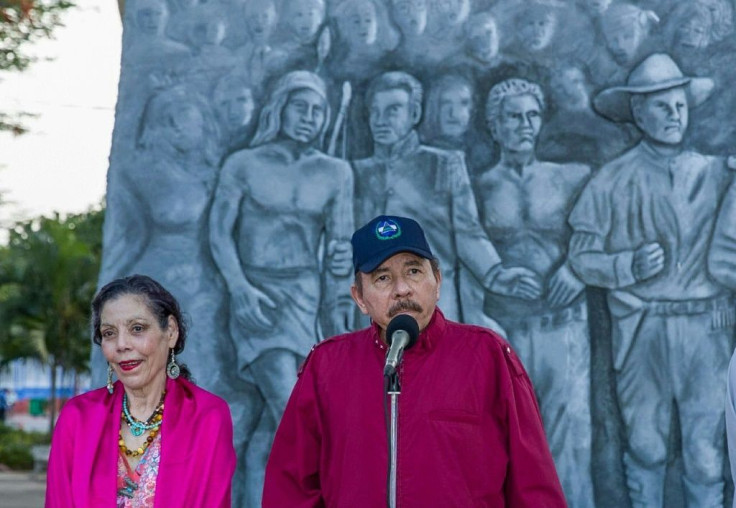Ortega And Murillo: Nicaragua's Shrewd Power Couple
Nicaragua's first couple, President Daniel Ortega and his wife Vice President Rosario Murillo, are both in their 70s but they show no signs of being willing to let go of power.
On Monday they announced their joint ticket to stand for reelection -- with Ortega bidding for a fourth successive mandate.
Former guerrilla leader Ortega, known as "el comandante" (the commander) for his iron-fisted rule, first held power for 11 years after the 1979 revolution.
But it is since his reelection in 2006 that he has gradually cemented his position and eliminated any serious rivals, leading to accusations of repressing dissent.
Ahead of November's presidential election, the power couple have had more than 30 opposition figures, including former guerrilla comrades and seven potential presidential candidates, detained on charges such as "undermining sovereignty."
Murillo, extravagant, with a penchant for poetry and art, is no less redoubtable and her husband's right-hand woman, although some believe she holds true power in the country.
Known as "Companera Rosario" (Comrade Rosario), she has risen through the party ranks since her husband's re-election to the point of joining him in an effective diarchy.
Ortega, 75, first seized control after his Sandinista guerrillas ousted the Somoza dynasty that had held power in Nicaragua from 1937 to 1979.
Now, critics accuse him of authoritarianism, corruption and of again turning Nicaraguan politics into a family affair.
"In the end we have a dictator in Ortega, a caudillo (strongman) ... he hasn't allowed any other candidates in his party and now, it seems, he won't allow a president in Nicaragua that isn't him," journalist Fabian Medina, the author of a biography on Ortega, told AFP.
Ortega headed a leftwing Sandinista junta with the support of Cuba and the Soviet Union after the revolution, and was elected president in 1985.
But, with the economy in ruins, he lost the following election in 1990.
With his Sandinista National Liberation Front (FSLN) party in opposition, he spent the next 17 years "ruling from below" -- fomenting violent protests and negotiating reforms with the government.
In 2006, he managed a presidential comeback, maneuvering to gradually take control over all state bodies, the police and the army.
Backed by the deep oil funds of Venezuela, under his ideological ally Hugo Chavez, he started social programs for the poor, many of whom continue to support him.
But he was also careful to nurture ties with Nicaragua's powerful business families, promising stability.

In 2014, his party in congress engineered a constitutional amendment scrapping presidential term limits, opening the way for him to remain president for life.
Ortega's shrewd politics, combined with his skill at ruthlessly cornering opponents, made him the leader of the FSLN, which he joined in 1963.
Born in the mining village of La Libertad, Ortega ditched his law studies to join the guerrillas.
He spent seven years behind bars, at times tortured, at the hands of the Somoza regime.
Being merely a first lady was never enough for the ruthlessly ambitious Murillo, 70.
Known for her fiery speeches laced with biblical and esoteric references she preaches "love and reconciliation" while in the same breath branding the opposition "blood-thirsty vampires."
As Ortega has retreated from the spotlight, his "loyal companion" and wife, Murillo -- with whom he has six children, one of them adopted -- has taken his place.
A ceaseless worker, a poet who speaks fluent English and French, and given to wearing colorful clothes and jewelry reminiscent of the hippie 1960s, Murillo always acted outside the confines of a traditional first lady.
Her first government role was as a self-appointed communicator-in-chief, making sure no other ministers spoke or acted without her permission.
She has imposed her eccentric taste on the capital by ordering the erection of several tall metal "trees of life" painted different colors and lit up at night.
Murillo met Ortega in 1977, when she was a revolutionary fighting the Somoza dictatorship. They soon started a relationship, marrying 11 years ago.
When Murillo's daughter from a previous marriage, Zoilamerica Narvaez, accused Ortega in 1998 of having sexually abused her since age 11, Murillo sided with her man. The charges were eventually rejected by a Sandinista judge.
Today, Zoilamerica lives in Costa Rica, where she speaks disparagingly of her mother, whom she says chose power over their relationship.
"Ortega found in Murillo what he lacked, and Murillo found in Ortega the vehicle she needed," said journalist Fabian Medina in his book.
Gioconda Belli, a writer and former guerrilla comrade who now opposes the government, said both Ortega and Murillo are "Machiavellian in the sense that the end justifies the means."
"They are playing for their lives because they cannot survive without political power," said Narvaez.
© Copyright AFP {{Year}}. All rights reserved.





















